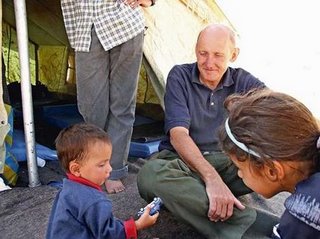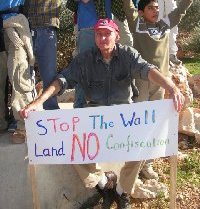From March 9 -12th, ecumenical and interfaith leaders gathered in Washington DC for Advocacy Days, three days of lobbying congress people on behalf of issues of justice and peace. In the picture, my colleague Rev. Dr. Brenda Girton- Mitchell addresses the gathering while Bishop Vicken Aykezian and Rev. Dr. Bob Edgar look on. For a report, click the link. http://www.ncccusa.org/news/060314eadwrap.html
Last week I spoke to the Vesper Society of Oakland, CA, on the intersection between interfaith relations and economic justice.
Interfaith Relations and Economic Justice
March 16, 2006
It is indeed an honor for me to be with you this evening to reflect with you on a topic of utmost importance this day. It is also an honor to be a member of such a distinguished panel. Thank you for inviting me.
Two foundational theological principles ground my work in interfaith relations and economic justice. First is “The earth is the Lord’s and all its fullness” which in effect means that everything we have and we think we own, in fact, belongs to God and has been entrusted to us, that we might use these as good stewards of God’s manifold grace. Second is that all human beings are created in the image of God. All human beings mean mothers and fathers and children, even grandparents. It means Muslims and Buddhists and Sikhs and Zoroastrians. It means, Iraqis, Afghans, Sudanese of Darfur, and those who live in ghettos of US inner cities. Not one of these persons is less valuable than you and me and George Bush, in God’s sight. Therefore when an Iraqi child or grand mother dies in the fighting, we cannot dismiss it as collateral damage. It is an affront to God. These principles both ground me and provide me direction.
There is a third principle. This principle in Jesus’ mouth is perhaps derived from these two principles. Let me set it up this way: someone, enthusiastic about WWJD (What would Jesus do?) asked, how Jesus would relate to people of other religions. He probably didn’t know any Hindus or Buddhists and certainly not Muslims, I said. Had he known them, I think he would enthusiastically relate to them. Jesus did not dissuade us from relating people of other faiths. He would have criticized those religious people for their hypocrisy and misuse of power, like he criticized the Jewish religious leaders of his time – and as he would criticize Christian leaders today. There were many religious communities in Jesus’ time, but we don’t find Jesus opposing them. But there was one religion that Jesus was firmly opposed to though, and that’s the religion of Mammon. “No one can serve two masters,” he said, “you will serve one and hate the other. You cannot serve God and Mammon.” There may have been at that time a myth of Mammon, a personified deity perhaps of wealth and greed. Contrary to Mammon in Jesus’ mind was the Kingdom or Rule of God, where, as a Christian hymn succinctly states “Justice serves with mercy and love is law’s demand.” I think Jesus would welcome any Muslim, Hindu, Jew, Buddhist or a non religious person, who will work with him against Mammon and for the household of God.
That reminds me of the oikumene, the Greek word that means household of God or the world. We use that term now to refer to the ecumenical movement; the Christian one, as if that’s the entirety of God’s household. There is an interesting debate going on in US ecumenical circles these days. There is a crisis in local ecumenism because local and state ecumenical councils are becoming interfaith councils. This is inappropriate, some object, because the ecumenical project of the visible unity of the church is not yet achieved! It will not be achieved until Jesus comes, I say to them, wake up and smell the coffee. The world (oikumene) is interfaith. God created us with all that diversity. The household of God must include people who are Muslims, Jews, Hindus, Buddhists and others. But we have this problem. We have erected massive barriers between these religious traditions. And we can hardly communicate. Well, that’s my job – to help Christians learn to build bridges across those barriers. I hope you will pray for me!
During this past century, we began to realize that we really needed to do just that. So Christians, with some reluctance, have came to the table. It began during the colonial period, and Christians were still feeling highly superior to everyone else. We still do. If you saw Franklin Graham on Nightline last night, or read the report of that in the newspaper today, you know that the attitude of superiority is still alive and well. But we worked at it now for almost a century. Some of the theological questions and issues are in a speech I made in February and you can read it on my blog site.
Our best attempts at theological conversations, as important as they are, were far removed from most people in churches and these didn’t make any sense to them. But over the past 20 years or so, we’ve begun to understand that there is a critical value to working together, both locally and nationally.
Over the years, we have also begun to understand two important principles. One is that our work must be “supra-ordinate.” By that we mean is that when two or more religious traditions work together, their achievement is greater than the sum of what they can do separately. The second is that religious leaders coming together can create “track 2 diplomacy.” If what politicians do is track 1, and they keep failing, track 2 brings religious, philanthropic, community, academic, business leaders together in a Civic Public Forum. Their moral authority and large following often can yield results that track 1 cannot achieve.
Now, let me tell you about local and national organizing, specifically for economic justice. I lived in Chicago for over 20 years, a good part of it in the south side of Chicago in Hyde Park where I pastored a church for 14 years. If you know anything about the south side, you would know that it is largely African American, that the people are mostly poor, and the communities are depressed. Robert Taylor Homes which is a series of hi rise project buildings that hold 1000 families per building and is known to be the poorest community in the United States was less than 10 blocks from my church. Drugs and gangs were rampant in those neighborhoods. I had many congregants from those depressed neighborhoods. Yes, and I have conducted funerals for those who fell victim to drive by shootings, and I have intervened to settle gang conflicts that arose from time to time in our youth group. And my claim to fame there is organizing a boys' basketball team in Englewood, one of the most depressed of the south side communities, and taking them to championship in a Chicago-wide tournament. Organizing for that occurred through the young people who hungrily participated in small group home Bible Studies I conducted in several locations in that community. Hungrily, because I think they had no idea how the Bible spoke to their daily situation of economic injustice.
My church was also in a powerful neighborhood. One block to the west was Jesse Jackson’s Operation Push, two blocks to the east and one to the north was Minister Louis Farakkhan. Barrack Obama, before he became the star he is now, lived a block from my church. It was clear to me that the dynamic of power was critical in addressing the issues of economic justice. And so together with my colleagues in other churches, we created a congregation-based community organization, which we affiliated with the Gamaliel Foundation, a network of community organizations now in 28 metropolitan areas. There are three other national networks, IAF (Industrial Areas Foundation), DART (Direct Action and Research Training) and headquartered right here in Oakland is PICO (Pacific Institute of Community Oraganizing).
Gamaliel concentrated on two campaigns: Metro Equity and Immigration Reform. They are both complex subjects. Let me for now tell you about Metro Equity. Minnesota State Senator Myron Orfield, in a brilliant study published in the late 90s called “Metropolitics” identified several Metropolitan areas in the United States where communities are clearly divided into areas of concentrated wealth and concentrated poverty. A causal visitor to most any US city or town might observe that those on the other side of the tracks live in blighted communities. Orfield’s thesis was that this did not automatically happen, that they were created systematically, through tax structures, discriminatory public policies (pertaining to businesses, housing, healthcare, schools), even discriminatory election laws.
For instance, if 1000 families live in one building and there’s a series of such buildings in a neighborhood, there is no way that all the employable people in those neighborhoods find work unless there’s a manufacturing plant near by. So the businesses that thrive there are the franchises which end up taking the capital from that neighborhood away to the affluent suburbs. One would think if people are enabled to buy their own homes in these neighborhoods, the neighborhoods would thrive. But even when people are properly employed and have decent credit ratings, banks still red-line. In fact the growth of a loan sharking industry like Pay Day Loans, because the regular banking industry is not reaching out to them, is devastating these communities. Take schools. The state of Illinois has determined that it takes a minimum of $4500 per year to educate a student, some south side communities spend $3500, while affluent suburbs spend up to $18,000. I can go on and on…
Two years ago, the NCC began its “Let Justice Roll” initiative. Led by former UCC president Paul Sherry, this is an organizing network which engages churches, particularly those in poor communities. These days they are working on a Living Wage Campaign. Some states have raised the minimum wage now to $10 and 11, from the measly $5.15 it is now. Benefit Bank is a computer program that is set up in a church or community organization which allows a person to write their basic information on a “Turbo Tax” type questionnaire, after which the program tells the person all the federal and state funds they are eligible to apply for, and prints out all the relevant forms. The program now functioning in 48 locations in FL, KS, PA, and set to expand nationwide in a few years. If the earth is indeed the Lord’s, that means that the earth’s resources, including its public funds, need to be allocated in a way is just and equitable.
Our current NCC emphasis is: Peace, Poverty and Planet Earth. That is, promoting peace, fighting poverty and encouraging the proper stewardship of Planet Earth. On the economic justice front, we have now undertaken to seriously engage with the Millennium Development Goal of ending the poverty that kills, by the year 2015. On our website you will find our latest publication, and a curriculum that helps churches deal with that subject.
That then moves my conversation from the local organizing to the global. As you can see, the pattern is not dissimilar. There are areas of concentrated wealth and areas of concentrated poverty, and the disparities grow every day. Now for a final comment then.
I was born in Sri Lanka at a time when the British empire was crumbling around me. That’s the good news. Empires do not last forever. Just so we are clear, the European invasions did not occur because the colonized countries were poor. It happened because the colonized countries were rich with resources. Just also so we are clear, Christianity in Asia is as old as St. Thomas the Apostle. Sometimes they are referred to as the younger churches. There was Christianity in Sri Lanka as far back as the 6th century. Today, these countries are economically struggling because the colonizers exploited those resources, and the same colonizing attitude prevalent today.
Let me give you an example. When the tsunami occurred, evangelists in the guise of relief workers poured into the country. Even reputed and massive NGOs such as World Vision would not disclaim their evangelistic agenda. When Antioch Community Church of Waco, Texas sent a team to do children’s ministry, which in their mind clearly included evangelism, that was properly seen as preying upon the most vulnerable population. A member of a Conservative Baptist Church in Chicago argued with me recently that such disasters are God’s way of providing an unprecedented opening to countries that are usually closed to evangelism.
The connection between evangelism and globalization must not be lost. They used to say in Sri Lanka, "When you get saved you get an American accent." Now they say when you get saved you also develop a taste for Coca Cola. Many critics of the new evangelistic movements suggest that what evangelists are doing is nothing less than priming the pump for economic globalization, which clearly is the new colonialism.
Fighting economic injustice, both in its local and global manifestations, provides a common agenda for religious communities.





